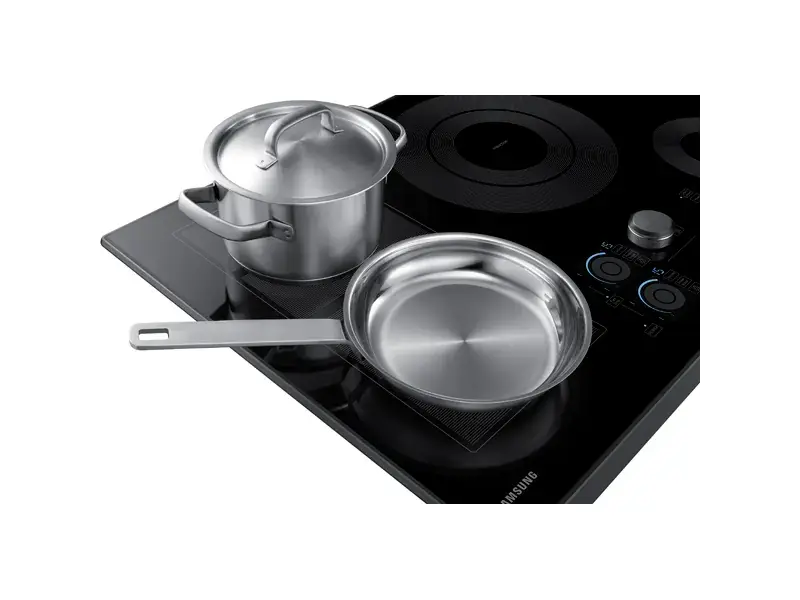Benefits of an Induction Cooktop
Induction cooktops, stovetops or hobs are increasingly becoming the preferred choice for cooking in numerous Australian households. Not only do they offer exceptional cooking advantages, but they can also contribute to enhancing the overall aesthetic appeal of your kitchen.
Traditional stovetops generate heat through a gas flame or electrical heating elements, while induction technology uses electromagnetic fields to directly heat pots and pans, providing, faster cooking times, and greater energy efficiency.
How does induction work?
Ultimately, the suitability of an induction cooktop depends on individual preferences, cooking habits, and lifestyle considerations. The advantages will appeal to the majority of consumers and cooking enthusiasts, including faster heating times, precise temperature control, energy efficiency, safety features, and ease of cleaning. How it works!
- Electromagnetic Field - When an induction cooktop is turned on, it generates a high-frequency electromagnetic field below the ceramic surface.
- Magnetic Reaction This electromagnetic field interacts with compatible ferrous magnetic cookware typically made of materials like cast iron or magnetic stainless steel for the induction process to work.
- Heat Generation - The magnetic field induces electric currents within the metal of the cookware. These currents generate heat directly in the cookware's base, heating the food and contents inside the pan.
- Precise Control - The induction cooktop allows for precise control of the heat by adjusting the strength of the electromagnetic field. When the cookware is removed or incompatible cookware is used, induction cooktops often have safety features that automatically turn off or reduce the heat.

Advantages of induction cooktops:
There is no double installing an induction cooktop will help reduce your cooking time, and time spent in the kitchen. Benefits of an induction cooktop include:
Energy Efficiency- Induction cooking is more energy-efficient than gas or traditional electric stovetops because it directly heats the pan via electromagnetic energy. This results in less wasted heat and faster cooking times.
Faster Cooking - Induction cooktops heat up significantly faster than traditional stovetops. The heat is instant and precise, allowing for quicker cooking times.
Safety Induction cooktops remain relatively cool to the touch because they heat the pan directly, not the cooktop surface. They also have safety features like automatic shut-off when no cookware is detected or when the cookware is removed.
Precise Temperature Control They offer precise temperature control, allowing you to adjust heat levels quickly and accurately. This is particularly beneficial for delicate cooking tasks that require specific temperatures.
Easy to Clean Since the cooktop itself doesn't get very hot, spills and splatters are less likely to burn onto the surface. The smooth, flat surface is easy to clean with a simple wipe-down.
Improved Cooking Experience - Induction cooktops provide consistent and even heat distribution across the cooking surface, reducing the likelihood of hot spots and uneven cooking.
Environmental Friendliness Due to their energy efficiency, induction cooktops are considered more environmentally friendly than other cooking methods, as they consume less energy and produce less waste heat.
Child Safety Some induction cooktops come with safety features like lock functions that prevent children from accidentally turning them on.
Disadvantages of induction cooktops
While induction cooktops offer numerous benefits over traditional models, they also have some drawbacks: One to consider is the need to have compatible cookware that has ferrous materials and a flat, magnetic bottom to effectively work with induction technology. Other disadvantages include
Initial Cost - Induction cooktops can be more expensive upfront compared to traditional gas or electric stoves. However, their energy efficiency might save money on utility bills in the long run.
Electronic Components and Repairs Induction cooktops contain electronic components that may require specialised repair or maintenance if they malfunction. This can potentially be more costly than repairing traditional stovetops.
Requirement for Compatible Cookware - Induction cooktops require cookware made of ferrous materials like cast iron or magnetic stainless steel to function efficiently. Cookware that isn't compatible won't work on these cooktops, so you might need to invest in new pots and pans.
Noise - Some induction cooktops might produce a slight humming sound during operation, especially when using higher power settings. While not typically loud, it might be noticeable to some users.
Sensitivity to Cookware Placement - Induction cooktops might be sensitive to the placement and size of cookware. If the pan is too small for the cooking zone or not centred properly, the cooktop might not recognize it or heat it efficiently.
Potential for Scratching - The glass-ceramic surface of induction cooktops can scratch, especially if you slide or drag cookware across the surface. Careful handling and using appropriate cleaning tools are necessary to prevent scratches.
Learning Curve - Some users might experience a learning curve when transitioning from conventional stoves to induction cooktops, especially regarding adjusting to the immediate and precise heating capabilities.

Your local induction cooktop installation experts
If you would like to speak with one of our induction cooktop installation electricians, phone 1300 016 671 or complete our online enquiry form and we will be in touch.
